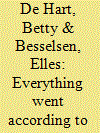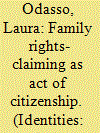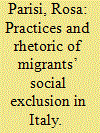|
|
|
Sort Order |
|
|
|
Items / Page
|
|
|
|
|
|
|
| Srl | Item |
| 1 |
ID:
177891


|
|
|
|
|
| Summary/Abstract |
Academic literature has studied the legal consciousness of common citizens: the way ordinary people think and talk about law in their everyday lives. Building on this literature, we explore how Dutch female citizens with a migrant partner experience the impact of migration law on their everyday lives. We questioned how legal consciousness is linked to intimate citizenship, thus demonstrating how ‘private’ matters such as intimate relationships, marriage, and family have a profound impact on citizenship. Based on two sets of interviews, conducted in 2000 and 2016, we were able to determine how these women, despite being citizens formally, experienced the profound impact of increasingly restrictive family reunification policies. Contrary to our expectations, female sponsors continued to express considerable support for restrictive migration law. In performing intimate citizenship, they claimed an exception from the strict application of the rules for their particular family situation, rather than radical change.
|
|
|
|
|
|
|
|
|
|
|
|
|
|
|
|
| 2 |
ID:
177893


|
|
|
|
|
| Summary/Abstract |
Ethnographic and biographical research conducted with mixed-status couples and non-governmental organisations in France and Belgium provides insights into how the citizen partners of mixed-status relationships define and assert their family rights. In response to injustices suffered, from the state or from the migrant (non-citizen) partner, these citizens turned to organisations with contrasting discourses on marriage migration. These organisations encouraged them to participate in collective actions, and to give voice to their intimate experiences. Drawing on accounts of ‘intimate citizenship’, this article explores the citizenship-belonging nexus through lenses of performativity and intersectionality. Gender and ethnicity interact to influence interactions between citizen partners and the state, the tension between their virtual and actual social identities, and – ultimately – their assertions of citizenship, with personal status underpinning public claims. By speaking and acting in the name of their private lives and choices, these citizen partners affirm their (intimate) citizenship through its public performance.
|
|
|
|
|
|
|
|
|
|
|
|
|
|
|
|
| 3 |
ID:
146075


|
|
|
|
|
| Summary/Abstract |
Theorists of globalization as well as activists' writing from a range of positions have argued that intimate practices are taking centre stage and becoming part of global discourses in the process. This holds true for the institution of marriage and the associated ideas about appropriate family forms, but also more generally for the ways in which ideas about ‘modern selves’ are realized in relationships based on reflexivity and self-knowledge through engagement with an intimate other.
|
|
|
|
|
|
|
|
|
|
|
|
|
|
|
|
| 4 |
ID:
141470


|
|
|
|
|
| Summary/Abstract |
The article aims to investigate the intersection of legislative dimensions, economic conditions and intimate life contributing to racialising and marginalising the poorest non-European migrants. First, this article focuses on the central role played by the private life in claiming citizenship rights and in building a sense of belonging within migratory contexts. As a result, mixed couples become a border zone through which the state disciplines immigrants according to their class, nationality and gender. On the other side, mixed couples and their intimate lives define resistance against the state’s biopolitical power to control people and become the space of intimate citizenship. Second, the article analyses the matrix for immigrants’ exclusion and differentiation embodied within the institutional and legislative system through immigration and citizenship laws. Therefore, the ‘coloniality power matrix’ becomes an active component of the naturalisation system of social differences at an institutional level.
|
|
|
|
|
|
|
|
|
|
|
|
|
|
|
|
|
|
|
|
|